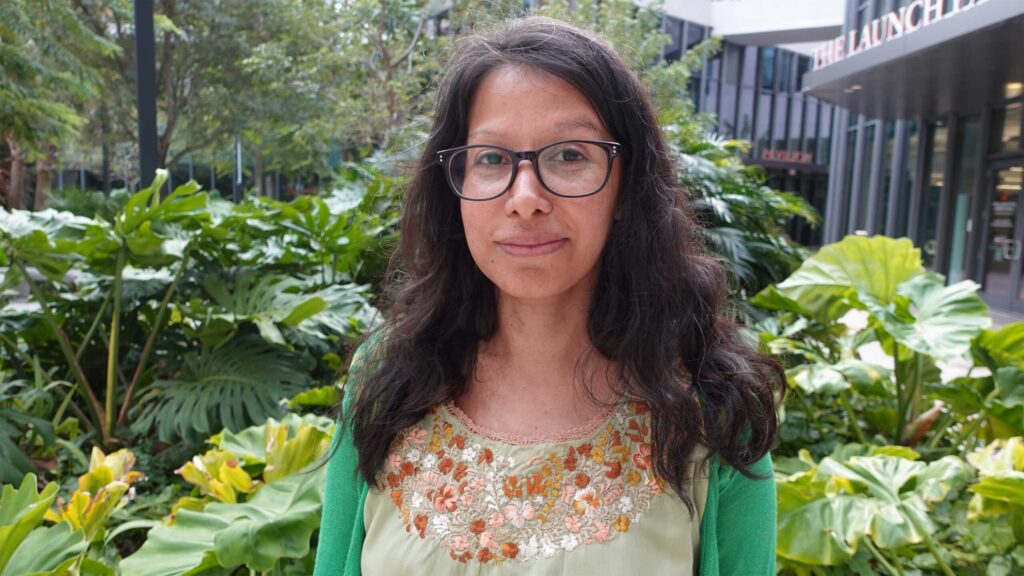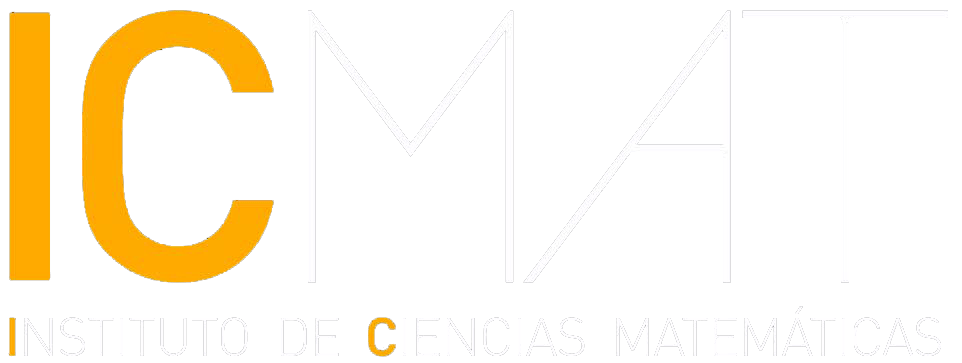Program ‘Enhancing Bridges between Spain and Latin America’.
She Does Maths: Raquel Perales (Centro de Investigación en Matemáticas, CIMAT, Guanajuato, Mexico), IMSA Latin American Research Award in Mathematics 2024 – Category: Young Mathematicians

Raquel Perales moments before receiving the IMSA 2024 Latin American Research Award in Mathematics. Image: Laura M. Iraola/ICMAT
Laura Moreno Iraola (ICMAT)
Raquel Perales has been a researcher at the Center for Mathematical Sciences (CIMAT) in Guanajuato (Mexico) since January 2024, where she joined after being a postdoctoral researcher for seven years at the Institute of Mathematics of the National Autonomous University of Mexico (UNAM). Also earlier this year she received the Latin American Mathematics Research Award IMSA (Institute for the Mathematical Sciences of the Americas) 2024, in its first edition -in the category of young mathematician-, a recognition that she believes will open new opportunities for her. Perales received her PhD in 2015 from Stony Brook University (SBU, New York) under the supervision of Cristina Sormani (The City University of New York, CUNY) and Blaine Lawson (SBU), in the area of Riemannian geometry, in which she continues her research. “This field studies how much objects curve, and if they curve in a certain way, what properties can be deduced from that type of curvature,” she explains in an interview in Miami a few days before receiving the award.
She began her research career because, after doing mathematics, she saw that she liked geometry above any other field, which led her down a more theoretical path. “Unlike other areas, you can make representations and see how things change, just like making a movie, which is why I like geometry,” she says. Although she has excelled in mathematics since she was a child and, in fact, participated in training for the Mathematical Olympiad in Mexico, she believes that she has reached where she is today because, above all, she has persevered.
Of all his work, one in particular stands out with a long history. “I started a collaboration believing that it was going to be a very quick article, because it was copying something that had already been done for Euclidean space, written by my thesis director and her collaborators, to hyperbolic space, but we realized that in that already published article there was an error (corrigendum), and it could not be copied so easily. In addition, we also wanted to use that article to produce a new result,” says Perales. “From then on, I worked, together with different collaborators, for two or three years, on it,” he continues. “In the end, we published several papers: proving the error and correcting it, in two different ways, and we also got two other results from the new solution.”
At present, she is immersed, among other projects, in the writing of an article she is doing together with other Latin American mathematicians she met at a conference, precisely, on Latin American women mathematicians held at the Casa Matemática in Oaxaca (Mexico). “We are two Chilean researchers, two Argentinean researchers and myself. We all do geometry, but from different perspectives,” she explains. “We found a problem on which we can all work together, which has to do with mean curvature in a special type of varieties, such as Lie groups and other properties,” she says.
Perales considers, on the other hand, that thanks to the prize awarded by IMSA, “people will start to see, or rather, people will remember that we do mathematics in Mexico”. Especially now that science in the country is not going through its best moment, “especially in the last few years, when there have been important cuts in CONAHCYT (National Council of Humanities, Sciences and Technologies)”, says the researcher. This is in addition to the already existing difficulties that prevent research personnel from carrying out their daily work in optimal conditions. “For example, the Mexican peso, compared to other currencies, has very little value. When I was at the Institute of Mathematics of the National Autonomous University of Mexico (UNAM), from 2016 to 2023, I received a certain annual amount to travel, but it was insufficient, it only covered a plane ticket to Europe,” he laments.
Collaboration between ICMAT and Latin America
Since 2022, ICMAT has been part of IMSAC, a consortium of institutes and organizations that collaborate with IMSA. It is one of the Institute’s initiatives as part of its commitment to cooperate with academic institutions in Latin America for the development of research and education in mathematics.
In this sense, last April, the ICMAT, with the support of IMSA, has launched the collaboration program between both areas Enhancing Bridges between Spain and Latin America, one of the actions launched thanks to the achievement of the fourth accreditation as a Center of Excellence “Severo Ochoa” of the Institute.
This content has been automatically translated. The original text may differ slightly.
